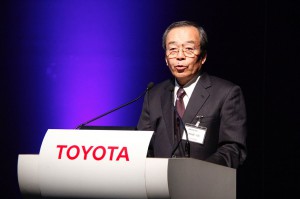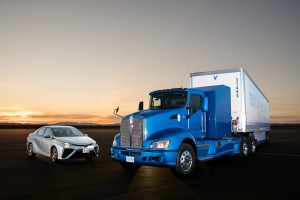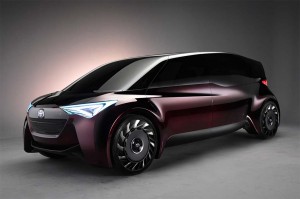
Takeshi Uchiyamada, co-chair of the Hydrogen Council and chairman of Toyota Motor Corp., is pushing for more investment in hydrogen technology.
Hydrogen could account for almost one-fifth of total final energy consumed by 2050, according to a new study from the Hydrogen Council, which was organized earlier this year with support from companies, including more than a half-dozen automakers, with a stake in fuel-cell technology.
“The world in the 21st century must transition to widespread low carbon energy use,” said Takeshi Uchiyamada, co-chair of the Hydrogen Council and chairman of Toyota Motor Corp., which has invested substantial sums over the years in fuel-cell technology, including the introduction of the hydrogen fuel cell-powered Toyota Mirai.
“Hydrogen is an indispensable resource to achieve this transition because it can be used to store and transport wind, solar and other renewable electricity to power transportation and many other things,” he said.
Uchiyamada said the Hydrogen Council has identified seven roles for hydrogen, which is why it is encouraging governments and investors to give it a prominent role in their energy plans. “The sooner we get the hydrogen economy going, the better, and we are all committed to making this a reality,” he said.
(Toyota, BMW get high marks for environmental practices. For the story, Click Here.)
The large-scale use of hydrogen could reduce annual carbon dioxide emissions and contribute roughly 20% of the abatement required to limit global warming to two degrees Celsius, noted the study, which was presented this week at the global climate summit in Bonn, Germany.
In addition to being a key pillar in energy transition, the study shows that hydrogen has the potential to develop $2.5 trillion worth of business, creating more than 30 million jobs by 2050, the study said.
On the demand side, the Hydrogen Council sees the potential for hydrogen to power about 10 to 15 million cars and 500,000 trucks by 2030, with many uses in other sectors as well, such as industry processes and feed stocks, building heating and power, power generation and storage.
The study comes on the heels of two other efforts covering the impact electric vehicles will have on the automotive industry as well as the long-term demands for petroleum-based vehicles will see between now and 2040.
This study, which was prepared with help from McKinsey & Co., predicts that the annual demand for hydrogen could increase tenfold by 2050 to almost 80 EJ in 2050 meeting 18% of total final energy demand in the 2050 two-degree scenario.
(Click Here to see why GM thinks bigger is better when it comes to hydrogen.)
“At a time when global populations are expected to grow by 2 billion people by 2050, hydrogen technologies have the potential to create opportunities for sustainable economic growth,” the study said.
However, reaching such scale would require substantial investments; approximately $20 billion to 25 billion annually for a total of about $280 billion through 2030.
Within the right regulatory framework—including long-term, stable coordination and incentive policies—the report considers that attracting these investments to scale the technology is feasible. The world already invests more than $1.7 trillion in energy each year, including $650 billion in oil and gas, $300 billion in renewable electricity, and more than $300 billion in the automotive industry.
“This study confirms the place of hydrogen as a central pillar in the energy transition, and encourages us in our support of its large-scale deployment. Hydrogen will be an unavoidable enabler for the energy transition in certain sectors and geographies. The sooner we make this happen the sooner we will be able to enjoy the needed benefits of Hydrogen at the service of our economies and our societies,” said Benoit Potier, chairman and CEO, Air Liquide.
“Solutions are technologically mature and industry players are committed. We need concerted stakeholder efforts to make this happen; leading this effort is the role of the Hydrogen Council.”
The Hydrogen Council called upon investors, policymakers, and businesses to join them in accelerating deployment of hydrogen solutions for the energy transition. Launched at the World Economic Forum in Davos in early 2017, the Hydrogen Council is a first-of-its-kind global CEO initiative to foster the role of hydrogen technologies in the global energy transition.
(To see more about what products are in Toyota’s hydrogen portfolio, Click Here.)
Current members include 18 leading multinationals, including automakers Audi, BMW Group, Daimler AG, General Motors, Honda, Hyundai Motor and Toyota.


